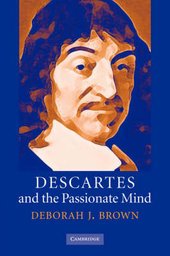
|
Descartes and the Passionate Mind
Hardback
Main Details
| Title |
Descartes and the Passionate Mind
|
| Authors and Contributors |
By (author) Deborah J. Brown
|
| Physical Properties |
| Format:Hardback | | Pages:244 | | Dimensions(mm): Height 236,Width 158 |
|
| Category/Genre | Western philosophy - c 1600 to c 1900
Philosophy of the mind |
|---|
| ISBN/Barcode |
9780521857284
|
| Classifications | Dewey:194 |
|---|
| Audience | | Postgraduate, Research & Scholarly | |
|---|
|
Publishing Details |
| Publisher |
Cambridge University Press
|
| Imprint |
Cambridge University Press
|
| Publication Date |
22 June 2006 |
| Publication Country |
United Kingdom
|
Description
Descartes is often accused of having fragmented the human being into two independent substances, mind and body, with no clear strategy for explaining the apparent unity of human experience. Deborah Brown argues that, contrary to this view, Descartes did in fact have a conception of a single, integrated human being, and that in his view this conception is crucial to the success of human beings as rational and moral agents and as practitioners of science. The passions are pivotal in this, and in a rich and wide-ranging discussion she examines Descartes' place in the tradition of thought about the passions, the metaphysics of actions and passions, sensory representation, and Descartes' account of self-mastery and virtue. Her study is an important and original reading not only of Descartes' account of mind-body unity but also of his theory of mind.
Author Biography
Deborah J. Brown is Senior Lecturer in Philosophy at the School of History, Philosophy, Religion and Classics, University of Queensland.
Reviews"Brown's book is historically and philosophically rich and provocative. Her discussion in chapters 3-5 deftly illustrates the way in which attention to the Passions helps to shed a new light on long-standing questions in the interpretation of Descartes, and she also elaborates a challenging approach to understanding the Passions as a whole. Descartes scholars, philosophers interested in early modern conceptions of the passions, and philosophers interested in the history of theories of the passions will all profit from engaging with Brown's book." - Sean Greenberg, University of California, Irvine
|